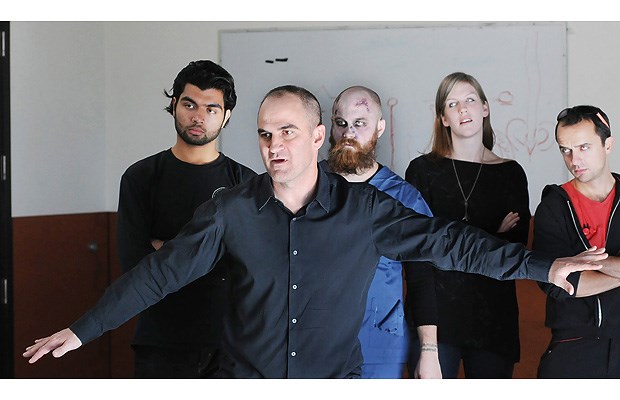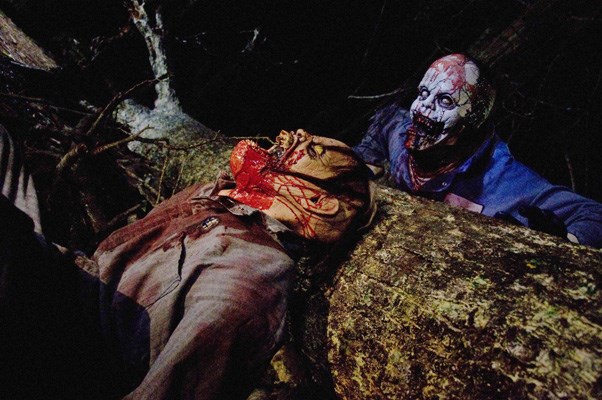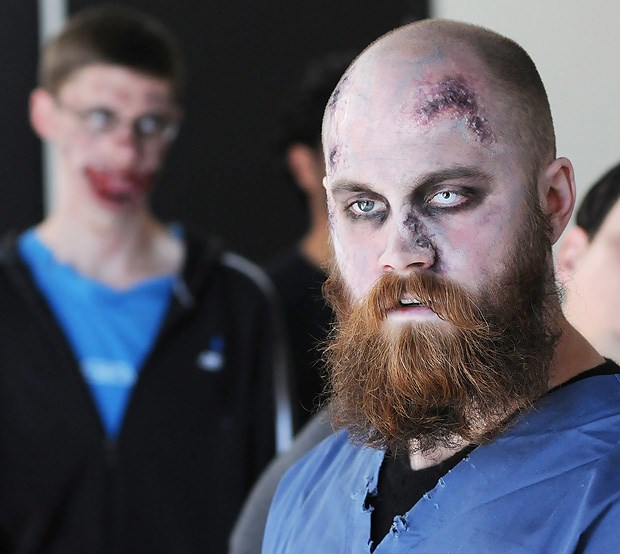Sgt. William Sullivan looks nervous as he addresses the camera. A spokesperson for the Department of National Defence, he's been tasked with delivering an urgent message to Canadians about a new virus first spotted in Japan that has now invaded our own soil.
He explains that exposure to the highly contagious virus is not only fatal but, even worse, only fatal temporarily.
"Due to some residual brain function which we've been unable to identify, the body of the deceased reanimates," he says, his voice rising, in the recently shot video. "The resultant walking corpses are extremely dangerous. They are violent and seem to have acquired a taste for human flesh!"
Fortunately for us, Sgt. Sullivan is an actor named Raphael Kepinski wearing a soldier's uniform, and the footage part of an online teaser for a new interactive theatre experience called The Zombie Syndrome rather than a particularly grim public service announcement.
The site-specific play is the latest offering from The Virtual Stage, an innovative local theatre company gaining a reputation for mixing digital technology into live performances.
While most plays require you to turn off your phone before a show begins, this one needs you to instead keep it on and use its GPS app to follow clues while racing around the city trying to find a missing scientist's cure for the plague.
The Zombie Syndrome's playwright and director, Andy Thompson, says it's unlike any show the city has ever seen.
"The audience has to go around in a scavenger hunt type sense and follow the trail of clues that this mad doctor has put forward to make sure only the right people have access to his laboratory," he told the Courier over coffee at a Commercial Drive cafe. "The audience is really the lead role of the show, kind of like a first-person shooter video game."
Thompson was careful not to spill his guts regarding details of the show, but admitted staging a zombie apocalypse in public settings presented some unique artistic challenges.
"I have had quite a remarkable journey dealing with a variety of stakeholders, including the Vancouver Police Department. I originally wanted there to be zombie-killing in the streets but, in getting my special events permit, I had to go through a police department representative and there was a concern-and a completely valid one-that people would be upset. When I was talking with him, I was jokingly but also quite literally commenting that he was functioning as dramaturg because I couldn't do what I wanted to do. For example, there was a scene where a skateboarder kills a zombie with a skateboard in an alley and he said, 'You just can't do that.'"
The Studio 58 graduate is not a horror buff, but found himself drawn to zombie culture for its unique potential to blend tragedy and comedy.
"They are very terrifying, yes, but also completely implausible. There is always an element of 'oh my god, this is so ridiculous' but also it is so horrible at the same time, like some sort of comedic horror mashup."
Thompson says the show, which runs several times a day until the end of the month at an undisclosed location, will combine indoor and outdoor locations while providing audience members with a rare opportunity to feel they've saved the world
"It's simply about making people think and having a lot of fun in the midst of a zombie apocalypse."

The tagline for George Romero's classic 1978 horror film Dawn of the Dead claimed: "When there's no more room in hell, the dead will walk the earth." Things must be overcrowded down there lately as zombies are everywhere.
A study by 24/7 Wall St., a financial news website, found the zombie genre culture pumped more than $5 billion into the global economy last year alone and now goes far beyond movie ticket sales.
The ambulatory undead have seemingly won peoples' hearts and minds by, well, devouring peoples' hearts and minds (or any other available body part) and through sheer force of numbers have become a part of the 21st-century zeitgeist that refuses to lay down and die.
Nearly 11 million pairs of eyeballs watched the season premiere of The Walking Dead last Sunday night while the latest version of the video game Resident Evil shipped roughly four million copies in only its first two weeks on the market.
A production of Michael Jackson's classic Thriller video is making its way to Broadway while an ongoing Marvel comics storyline features zombified versions of the likes of Captain America, Iron Man, Wolverine and even formerly friendly neighbourhood Spider-Man chowing down on supervillains and fellow superheroes alike.
Even highbrow literature isn't immune, with Pride and Prejudice and Zombies, "the Classic Regency Romance-now with Ultraviolent Zombie Mayhem," spending months on top of international bestseller lists. They've even invaded the lexicon; we regularly now hear about zombie computers and zombie banks, and some people believe the current bleak global economy is partly to blame for the fascination with them.
Max Brooks, the bestselling author of World War Z: An Oral History of the Zombie War, sums it up this way on his website: "We are living in times of apocalyptic anxiety and we need a vessel in which to coalesce those anxieties. I think they reflect our very real anxieties of these crazy scary times. A zombie story gives people a fictional lens to see the real problems of the world. You can deal with societal breakdown, famine, disease, chaos in the streets, but as long as the catalyst for all of them is zombies, you can still sleep."
A fear of the living dead fits with a lot of our current legitimate concerns, including the fear of epidemic diseases such as SARS or swine flu, military-industrial complex skullduggery, global warming and/or the basic helplessness of governments to solve anything. It also arguably speaks to some of our more base desires, including having something to put a bit of excitement back into our day-to-day lives and providing a guilt-free outlet for homicidal impulses.
While the Twilight vampire movies were primarily filmed in the Lower Mainland, local residents themselves seem to have far more appetite for zombies as their preferred creature with an infectious bite, and The Zombie Syndrome certainly isn't the first time Vancouver's streets were overrun with people pretending to be zombies.
Heather McDermid, a marketing manager for the Vancouver New Music Festival, didn't realize she was creating a monster when she organized the city's very first Zombie Walk back in 2005.
"I was involved in one in Toronto, which was the first one in Canada, and I think maybe there were six or seven of us for the first time," says McDermid. "I moved to Vancouver the year afterward and thought it would be fun to do it here, but I wasn't really expecting as many people as ended up coming out. The original intent was so it would be kind of surprising and flash mob-style, plus doing it not near Halloween would make it kind of unexpected. My original reasons for doing it were more centred around community animation-no pun intended-and just having a fun, kind of off-the-cuff event."
Instead, about 400 zombie wannabes turned up to shamble through the city for the event's debut and-not unlike the new fast-moving zombies seen in films such as 28 Days Later and the 2004 remake of Dawn of the Dead-the annual Zombie Walk shows no sign of slowing down. Vancouver is also becoming associated with the living dead in a number of other ways as well.
The Rio Theatre's annual Dead on Film zombie short film festival has sold out for the past three years of its existence, and local filmmakers have produced both the world's first feature-length zombie-themed rom-com (Fido, directed by Andrew Currie and starring Burnaby's Carrie-Anne Moss) and stoner buddy comedy (Thomas Newman's Bong of the Dead). Vancouver is the headquarters of the makers behind the hugely popular Plants vs. Zombies free online game, and the city is also one of the settings for a new Microsoft Studios Xbox game called Deadlight.
McDermid agrees with Brooks that part of the appeal of zombies likely has to do with living in such uncertain times.
"One thing about zombies is you can map a whole lot of different things on to them. You can project the apocalypse, end-of-the-world thing or you can look at it from a corporate perspective where people do the day-to-day, daily grind kind of mindless zombies or you can look at the possibility of science getting out of control like in 28 Days Later. There are a lot of different facets you can project onto, so that probably helps with its wide appeal and make it such a part of the popular imagination."
People who would rather kill zombies than be chased by or dress up as the undead now have that option as well at the new Zombie Combat Zone. Located at the end of a dirt road in south Surrey, the sprawling complex provides an opportunity to shoot down armour-clad zombies with paintball guns as part of a scripted storyline involving dozens of actors.
Owner Ron McCall, a burly, biker-looking man with a long pointed beard, admits the level of demand there's been since he opened up shop a few weeks ago surprised him.
"I was expecting to maybe make enough money to make it through the winter and the next show and it has suddenly become another career," said McCall, a props master whose film credits include such straight-to-DVD splatter fests as Bloodsuckers, Yeti: Curse of the Snow Demon and the final installment of the Hellraiser franchise. He's already seeing repeat customers and has began adding extra nights midweek instead of weekend-only shows.
He believes the reason zombies have become such a pop culture phenomenon is they aren't as far-fetched as we'd like to think.
"It has something to do with they are the most humanistic of all the monsters. I think this is why it is so scary and why people are so attracted to things that scare them is because it could become real. There's no chance you're going to ever see a vampire or a mummy or Frankenstein or a werewolf, but this has a higher probability of becoming a real thing. Everybody knows there are a lot of things that are kept from us, so why not viral infections that could do something like this?"
McCall adds he is currently in discussion with celebrity shock rocker and filmmaker Rob Zombie about expanding the business into other countries.
"It's really taken on a life of its own."
Tickets for The Zombie Syndrome are available at thevirtualstage.org and more information about how to mow down the undead with paintballs at zombiecombatzone.com. Meanwhile, the Center for Disease Control also offers some (hopefully) tongue-in-cheek tips on how to survive a zombie apocalypse at cdc.gov.




